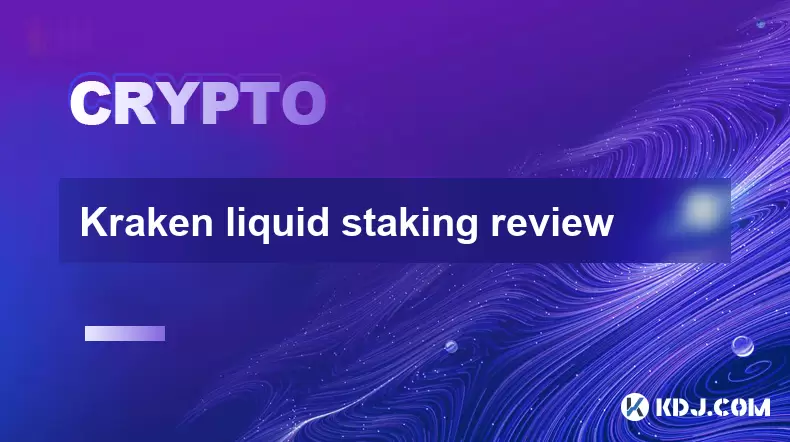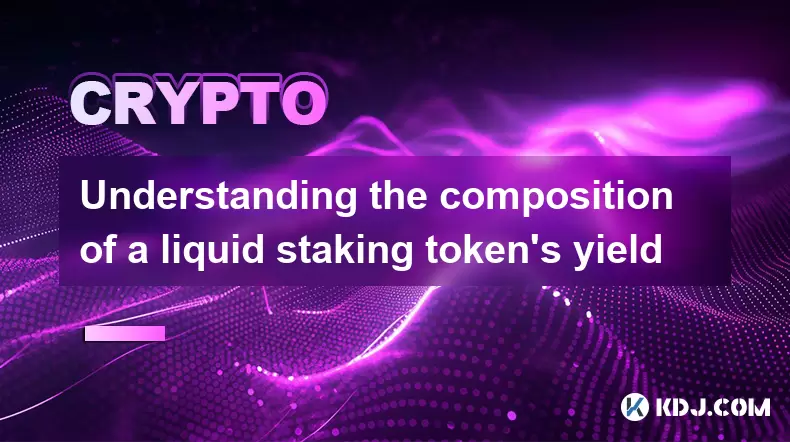-
 bitcoin
bitcoin $87959.907984 USD
1.34% -
 ethereum
ethereum $2920.497338 USD
3.04% -
 tether
tether $0.999775 USD
0.00% -
 xrp
xrp $2.237324 USD
8.12% -
 bnb
bnb $860.243768 USD
0.90% -
 solana
solana $138.089498 USD
5.43% -
 usd-coin
usd-coin $0.999807 USD
0.01% -
 tron
tron $0.272801 USD
-1.53% -
 dogecoin
dogecoin $0.150904 USD
2.96% -
 cardano
cardano $0.421635 USD
1.97% -
 hyperliquid
hyperliquid $32.152445 USD
2.23% -
 bitcoin-cash
bitcoin-cash $533.301069 USD
-1.94% -
 chainlink
chainlink $12.953417 USD
2.68% -
 unus-sed-leo
unus-sed-leo $9.535951 USD
0.73% -
 zcash
zcash $521.483386 USD
-2.87%
Kraken liquid staking review
Kraken offers liquid staking for ETH, allowing users to earn rewards while maintaining liquidity through KETH tokens that can be traded or used in DeFi.
Jul 21, 2025 at 04:49 pm

What Is Kraken Liquid Staking?
Kraken, a well-established cryptocurrency exchange, has expanded its services to include liquid staking, a feature that allows users to stake their proof-of-stake (PoS) assets while retaining liquidity. In traditional staking, users lock up their assets for a certain period, often sacrificing the ability to trade or use them elsewhere. Liquid staking addresses this issue by providing users with receipt tokens that represent their staked assets and can be traded or used in other DeFi applications.
Kraken’s implementation of liquid staking currently supports Ethereum (ETH), with plans to potentially expand to other PoS assets in the future. When users stake ETH through Kraken, they receive Kraken Staked ETH (KETH), which is a tokenized version of their staked ETH. This token accrues staking rewards over time and can be transferred, traded, or used in compatible decentralized finance (DeFi) protocols.
How Does Kraken Liquid Staking Work?
Kraken’s liquid staking mechanism is built on a trustless infrastructure that allows users to maintain control over their staked assets while benefiting from liquidity. Here’s how it works:
- Users deposit ETH into their Kraken account.
- They opt into the liquid staking program through the staking dashboard.
- The ETH is staked on the Ethereum network, contributing to network security and validation.
- In return, users receive KETH tokens, which represent their staked ETH plus accrued rewards.
- These KETH tokens can be withdrawn, traded, or used across compatible DeFi platforms.
Kraken maintains a direct staking infrastructure, meaning it does not rely on third-party liquid staking providers like Lido or Rocket Pool. This gives Kraken more control over the staking process and reduces potential counterparty risks.
Benefits of Kraken Liquid Staking
One of the most appealing aspects of Kraken liquid staking is the ability to earn staking rewards without sacrificing liquidity. This opens up several opportunities:
- Earn Passive Income: Users earn ETH staking rewards at competitive rates, typically ranging between 4% to 6% APR, depending on network conditions.
- Maintain Liquidity: Instead of locking up ETH, users receive KETH, which can be used in DeFi protocols to generate additional yield.
- No Minimum Staking Requirements: Kraken allows users to stake any amount of ETH, making it accessible to both small and large investors.
- Security and Trust: Kraken is a regulated U.S.-based exchange with a strong reputation for security, which adds an extra layer of confidence for users.
Additionally, KETH holders can benefit from compounding rewards automatically, as the value of KETH increases relative to ETH over time.
Step-by-Step Guide to Using Kraken Liquid Staking
To participate in Kraken liquid staking, follow these steps:
- Create a Kraken Account: Sign up and complete identity verification.
- Deposit ETH: Transfer ETH to your Kraken wallet.
- Navigate to the Staking Dashboard: Find the staking section in your account.
- Select ETH for Liquid Staking: Choose the amount of ETH you want to stake.
- Confirm the Transaction: Approve the conversion of ETH to KETH.
- Receive KETH Tokens: Your account will reflect the KETH balance, which begins earning rewards immediately.
- Use or Withdraw KETH: Transfer KETH to other wallets or DeFi platforms, or convert back to ETH at any time.
Each step is designed to be user-friendly and accessible to both novice and experienced crypto investors.
Is Kraken Liquid Staking Safe?
The security of Kraken liquid staking hinges on the platform’s reputation and infrastructure. Kraken operates a non-custodial staking model, meaning users retain ownership of their staked assets. However, there are still risks to consider:
- Smart Contract Risks: Although Kraken does not use third-party liquid staking contracts, its own smart contracts could be subject to vulnerabilities.
- Market Risk: The value of KETH may fluctuate based on Ethereum’s network performance and broader market conditions.
- Regulatory Risk: As liquid staking gains popularity, it may attract regulatory scrutiny, especially in jurisdictions like the United States.
Despite these concerns, Kraken has a strong track record of security and transparency, and it regularly undergoes audits to ensure the integrity of its systems.
Comparing Kraken Liquid Staking with Other Platforms
Kraken is not the only platform offering liquid staking. Competitors like Lido Finance, Rocket Pool, and Coinbase also provide similar services. Here’s how Kraken compares:
- Lido Finance: Lido offers stETH, a liquid staking token with broad DeFi integration. However, it relies on a decentralized validator network, which introduces some decentralization trade-offs.
- Rocket Pool: Known for its decentralized node operator model, Rocket Pool offers rETH, which is highly composable in DeFi but requires a higher technical barrier to entry.
- Coinbase: Coinbase’s cbETH offers similar functionality to KETH but with limited DeFi compatibility compared to Lido or Rocket Pool.
Kraken’s approach balances simplicity, trust, and usability, making it ideal for mainstream users who prioritize ease of use and security.
Frequently Asked Questions
Q: Can I unstake my ETH from Kraken liquid staking at any time?A: Yes, Kraken allows users to unstake their ETH, but the process may take some time depending on Ethereum network conditions and withdrawal queues.
Q: Are KETH tokens transferable to other wallets or platforms?A: Yes, KETH is an ERC-20 token and can be transferred to compatible wallets or used on DeFi platforms that accept it.
Q: Does Kraken charge fees for liquid staking?A: Kraken charges a performance-based fee, which is deducted from the staking rewards earned, not from the principal staked amount.
Q: How often are staking rewards distributed in Kraken liquid staking?A: Rewards are accrued continuously and reflected in the increasing value of KETH relative to ETH. There is no manual claiming required.
Disclaimer:info@kdj.com
The information provided is not trading advice. kdj.com does not assume any responsibility for any investments made based on the information provided in this article. Cryptocurrencies are highly volatile and it is highly recommended that you invest with caution after thorough research!
If you believe that the content used on this website infringes your copyright, please contact us immediately (info@kdj.com) and we will delete it promptly.
- Bittensor, Blockchain, and the AI Network Revolution: A New Era of Decentralized Intelligence
- 2026-02-01 19:05:02
- Altcoins Take Center Stage: Navigating Bitcoin's Shifts and Ethereum's Innovation
- 2026-02-01 19:05:02
- Beyond the Forecast: Is Carol Kirkwood's Departure a Whisper of BBC's Lingering 'Token Woman' Problem?
- 2026-02-01 16:25:01
- Bitcoin Plunges Amidst Liquidity Worries: A Record Low for Crypto Sentiment?
- 2026-02-01 16:25:01
- Pi Network's Mainnet: A Crypto Milestone Unveils a Complex Market Picture
- 2026-02-01 16:20:02
- Top Watch: Emerging Cryptocurrencies Charting New Territories in 2026
- 2026-02-01 16:15:01
Related knowledge

Understanding the composition of a liquid staking token's yield
Jul 20,2025 at 09:07am
What Is a Liquid Staking Token?A liquid staking token is a representative asset issued to users who stake their native cryptocurrency on a proof-of-st...

Is it better to stake directly or use a liquid staking service?
Jul 22,2025 at 08:21pm
Understanding the Basics of StakingStaking in the context of blockchain and cryptocurrency refers to the process of locking up digital assets to suppo...

What to do during an LST depeg event
Jul 20,2025 at 04:57pm
Understanding LST Depeg EventsAn LST (Liquid Staking Token) depeg event occurs when the token, which is typically pegged to the value of the underlyin...

How to find new liquid staking projects
Jul 30,2025 at 01:14pm
Understanding Liquid Staking and Its ImportanceLiquid staking is a mechanism that allows users to stake their cryptocurrency assets while still mainta...

Can you provide liquidity with liquid staking tokens?
Jul 22,2025 at 10:22am
Understanding Liquid Staking TokensLiquid staking tokens (LSTs) are derivative tokens that represent staked assets on a proof-of-stake (PoS) blockchai...

What are the best wallets for storing LSTs?
Jul 21,2025 at 03:14pm
Understanding LSTs and the Need for Secure StorageLSTs, or Liquid Staking Tokens, are derivative tokens representing staked assets on a blockchain. Wh...

Understanding the composition of a liquid staking token's yield
Jul 20,2025 at 09:07am
What Is a Liquid Staking Token?A liquid staking token is a representative asset issued to users who stake their native cryptocurrency on a proof-of-st...

Is it better to stake directly or use a liquid staking service?
Jul 22,2025 at 08:21pm
Understanding the Basics of StakingStaking in the context of blockchain and cryptocurrency refers to the process of locking up digital assets to suppo...

What to do during an LST depeg event
Jul 20,2025 at 04:57pm
Understanding LST Depeg EventsAn LST (Liquid Staking Token) depeg event occurs when the token, which is typically pegged to the value of the underlyin...

How to find new liquid staking projects
Jul 30,2025 at 01:14pm
Understanding Liquid Staking and Its ImportanceLiquid staking is a mechanism that allows users to stake their cryptocurrency assets while still mainta...

Can you provide liquidity with liquid staking tokens?
Jul 22,2025 at 10:22am
Understanding Liquid Staking TokensLiquid staking tokens (LSTs) are derivative tokens that represent staked assets on a proof-of-stake (PoS) blockchai...

What are the best wallets for storing LSTs?
Jul 21,2025 at 03:14pm
Understanding LSTs and the Need for Secure StorageLSTs, or Liquid Staking Tokens, are derivative tokens representing staked assets on a blockchain. Wh...
See all articles
























![[Audio stories] Streamer Became a Billionaire Overnight After Buying One Junk Coin [Audio stories] Streamer Became a Billionaire Overnight After Buying One Junk Coin](/uploads/2026/02/01/cryptocurrencies-news/videos/origin_697eaa9a495ed_image_500_375.webp)

















































